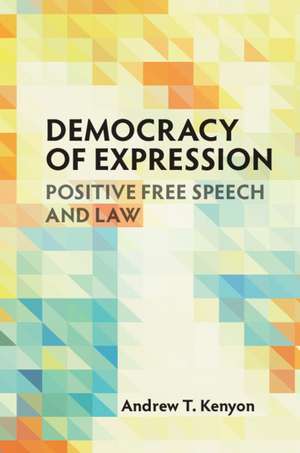Democracy of Expression: Positive Free Speech and Law
Autor Andrew T. Kenyonen Limba Engleză Paperback – 16 iun 2021
| Toate formatele și edițiile | Preț | Express |
|---|---|---|
| Paperback (1) | 285.37 lei 6-8 săpt. | |
| Cambridge University Press – 16 iun 2021 | 285.37 lei 6-8 săpt. | |
| Hardback (1) | 699.12 lei 6-8 săpt. | |
| Cambridge University Press – 16 iun 2021 | 699.12 lei 6-8 săpt. |
Preț: 285.37 lei
Nou
Puncte Express: 428
Preț estimativ în valută:
54.60€ • 57.01$ • 45.19£
54.60€ • 57.01$ • 45.19£
Carte tipărită la comandă
Livrare economică 04-18 aprilie
Preluare comenzi: 021 569.72.76
Specificații
ISBN-13: 9781108731898
ISBN-10: 1108731899
Pagini: 250
Dimensiuni: 230 x 150 x 15 mm
Greutate: 0.4 kg
Editura: Cambridge University Press
Colecția Cambridge University Press
Locul publicării:New York, United States
ISBN-10: 1108731899
Pagini: 250
Dimensiuni: 230 x 150 x 15 mm
Greutate: 0.4 kg
Editura: Cambridge University Press
Colecția Cambridge University Press
Locul publicării:New York, United States
Cuprins
Preface; 1. Introduction; 2. Positive Free Speech from Media Studies and Law; 3. Positive Free Speech and Democracy; 4. Positive Human Rights and Political Freedom; 5. US Legal Writing on Positive Free Speech; 6. German Broadcasting Freedom; 7. French Freedom of Communication and Pluralism; 8. Framing Communicative Freedom; Index.
Recenzii
'Democracy of Expression argues persuasively that democratic government entails positive rights to freedom of speech and that courts have a legitimate role in upholding them. The book shows extensive knowledge of French and German legal developments and a command of philosophical and media studies literature. It should be read by all free speech scholars.' Eric Barendt, Emeritus Professor of Media Law, University College London
'This book provides an urgently needed response to democracy's current plight: the collective failure to address the epochal shifts in our media environment. Retooling our regulatory and legal approach to free speech will not be easy – as Kenyon is fully aware – but the fate of democracy depends upon it.' Mark Andrejevic, Professor, Communications and Media Studies, Monash University
'Democracy of Expression cogently argues that a positive freedom of communication is implicit in the very concept of democracy. The analysis is stimulating, wide-ranging in its sources and lucid. This significant book is certain to become the authoritative reference point for future discussion.' Thomas Gibbons, Emeritus Professor of Law, University of Manchester
'This pathbreaking book intervenes in a vital debate about the free speech required for democratic governance. Kenyon presents an invaluable analysis for anyone who thinks democracy is worth defending and expanding.' Victor Pickard, Professor of Media Policy and Political Economy, University of Pennsylvania
'Democracy of Expression provides a fascinating exploration of a positive conception of freedom of speech, using an impressively rich array of comparative sources not often available in English. A must read for media law and free speech scholars alike.' Adrienne Stone, Professor of Constitutional Law, University of Melbourne
'This book provides an urgently needed response to democracy's current plight: the collective failure to address the epochal shifts in our media environment. Retooling our regulatory and legal approach to free speech will not be easy – as Kenyon is fully aware – but the fate of democracy depends upon it.' Mark Andrejevic, Professor, Communications and Media Studies, Monash University
'Democracy of Expression cogently argues that a positive freedom of communication is implicit in the very concept of democracy. The analysis is stimulating, wide-ranging in its sources and lucid. This significant book is certain to become the authoritative reference point for future discussion.' Thomas Gibbons, Emeritus Professor of Law, University of Manchester
'This pathbreaking book intervenes in a vital debate about the free speech required for democratic governance. Kenyon presents an invaluable analysis for anyone who thinks democracy is worth defending and expanding.' Victor Pickard, Professor of Media Policy and Political Economy, University of Pennsylvania
'Democracy of Expression provides a fascinating exploration of a positive conception of freedom of speech, using an impressively rich array of comparative sources not often available in English. A must read for media law and free speech scholars alike.' Adrienne Stone, Professor of Constitutional Law, University of Melbourne
Notă biografică
Descriere
Drawing from multiple scholarly fields, Kenyon examines free speech's positive dimensions of enablement and how they can be pursued.
